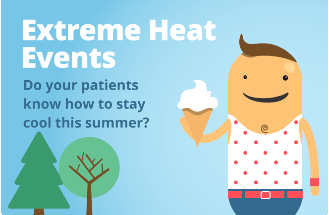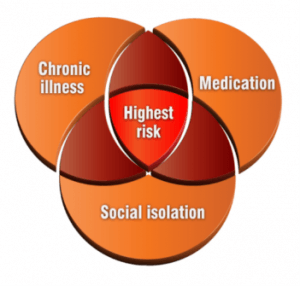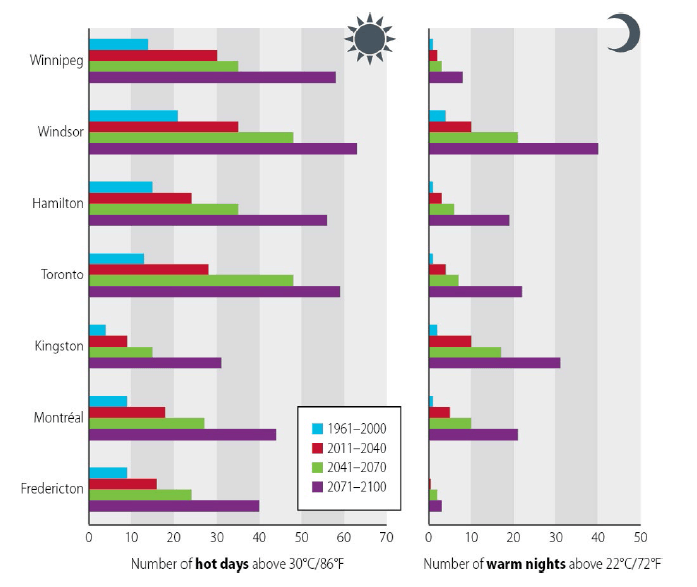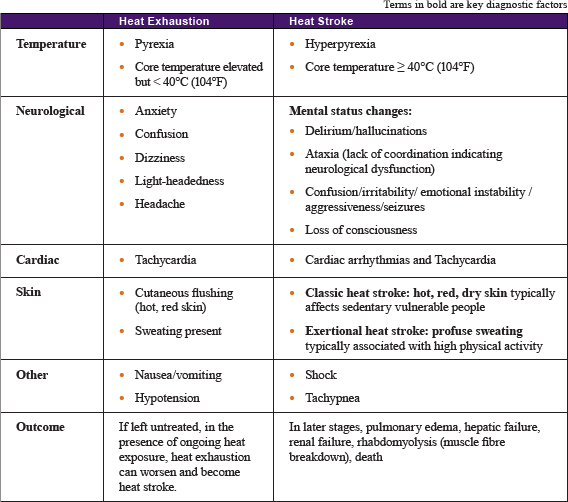Know the Risk and Stay Safe: Extreme Heat
 Extreme heat can have many implications for health care professionals. Knowing who is at the greatest risk of experiencing adverse health effects related to extreme heat is of great importance in the acute care and community settings. Additionally, from a systems perspective, health care facilities need to prepare for extreme heat events to ensure the safety of their patient population (Health Canada, 2011).
Extreme heat can have many implications for health care professionals. Knowing who is at the greatest risk of experiencing adverse health effects related to extreme heat is of great importance in the acute care and community settings. Additionally, from a systems perspective, health care facilities need to prepare for extreme heat events to ensure the safety of their patient population (Health Canada, 2011).
The graph below highlights the current and projected number of days exceeding 30 degrees Celsius for Canadian cities. You can see an increasing trajectory of the number of hot days for each Canadian city identified in the graph. The number of days with a maximum temperature of 30°C is projected to double by 2021-2040 and more than triple by 2081-2100, likely resulting in further heat-related mortality. Overall, Canada is projected to become much warmer, and urban areas tend to experience higher temperatures due to the urban heat island effect.
Please note: Sustained night-time temperatures do not allow the body to get some relief at night from the heat (Berry, Clarke, Fleury, & Parker, 2014).
Key risk factors associated with heat-related illnesses and death in extreme heat:
• Older adults (>75 years)
• Individuals with chronic disease – cardiovascular, respiratory, neurological, and renal disease as well as mental and behavioral disorders related to substance use/abuse, mental illness, and metabolic conditions.
• Living conditions – confined to bed, social situation, reduced income, malnutrition, and reduced access to cooling options.
• Medication use – antiadrenergics and beta blockers, anticholinergics, antidepressants, antihistamines, anti-parkinson’s agents, antipsychotics, sympathomimetics, and diuretics.
Know the signs and symptoms of heat exhaustion vs. heat stroke:
Treatment priorities include:
Cool and Hydrate
• Heat stroke is a medical emergency and requires hospitalization.
• Cool the body early and monitor vital signs. This intervention can prevent later stage damage and death.
– Exertional heat stroke – cool quickly with ice-water baths
– Classic heat stroke (more often occurs in people with other chronic conditions) – cool gradually, as to not exacerbate the conditions
• Treat dehydration
• Check for over-hydration, hyponatremia, especially in athletes; assess patient’s recent physical activity
(Health Canada, 2011)
To prepare for and cope with extreme heat, your health facility can take action to:
• Cool buildings and outdoor spaces
• Educate and protect staff
• Consider heat when caring for residents/patients during extreme heat
Develop a heat emergency plan:
• Administrative procedure to meet emergency/serge staff capacity needs
• Plan staff training on heat health risk information
• Steps to follow to keep older adults and the chronically ill cool and comfortable
• Emergency cooling options (air conditioned rooms, fans, ice-water baths/showers)
• Identify need for back-up generators, during possible power brown outs/black outs
• Plan to manage employee heat exhaustion (eg. air conditioning in the staff room, light weight breathable uniforms)
(Health Canada, n.d)
Post written by Jennifer Morin – Nursing Instructor
Jennifer has been certified in the Health Care Workers Guide to Extreme Heat Events.
References:
Berry, P., Clarke, K., Fleury, M.D., & Parker, S. (2014). Human health. In F.J. Warren & D.S. Lemmen (Eds.), Canada in a changing climate: Sector perspectives on impacts and adaptation(pp. 191-232). Ottawa, ON: Government of Canada.
Health Canada. (n.d). Health care facilities preparation for extreme heat: Recommendations for retirement and health care facilities. Retrieved from https://www.canada.ca/content/dam/hc-sc/migration/hc-sc/ewh-semt/alt_formats/hecs-sesc/pdf/pubs/climat/health_facilit-instal_sante/health_facilit-instal_sante-eng.pdf
Health Canada. (2011). Extreme heat events guidelines: Technical guide for health care workers. Retrieved from http://www.hc-sc.gc.ca/ewh-semt/alt_formats/pdf/pubs/climat/workers-guide-travailleurs/extreme-heat-chaleur-accablante-eng.pdf
Mac Health. (2017). Extreme heat events. Retrieved from https://machealth.ca/programs/ehe/


